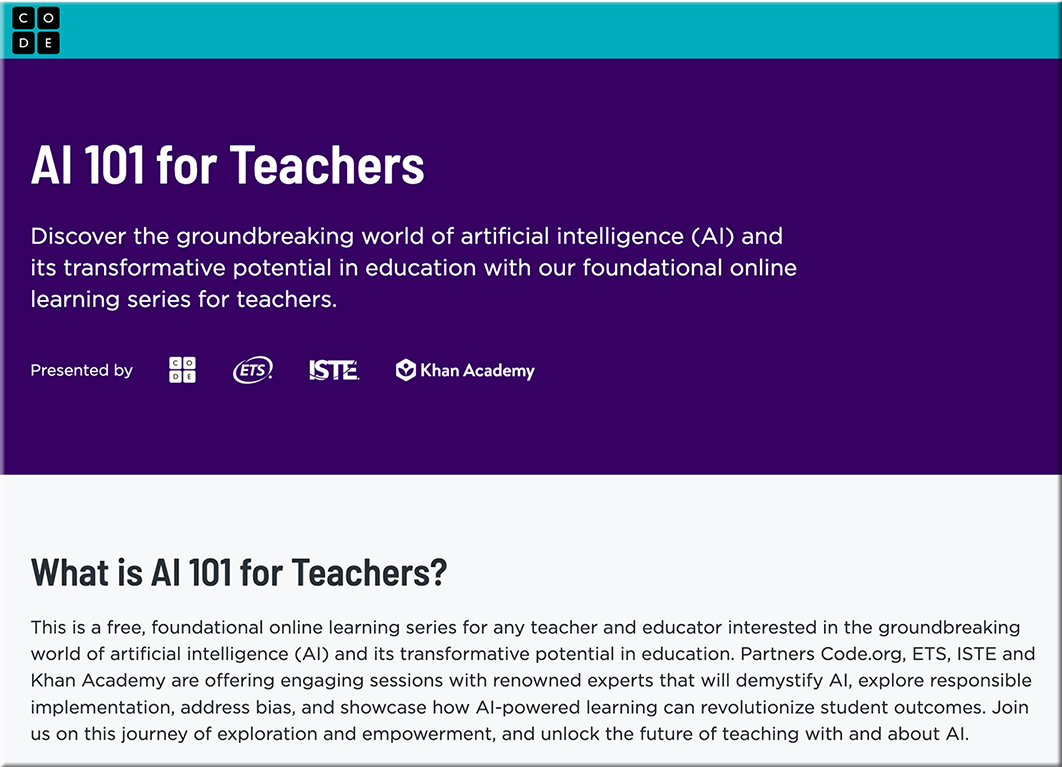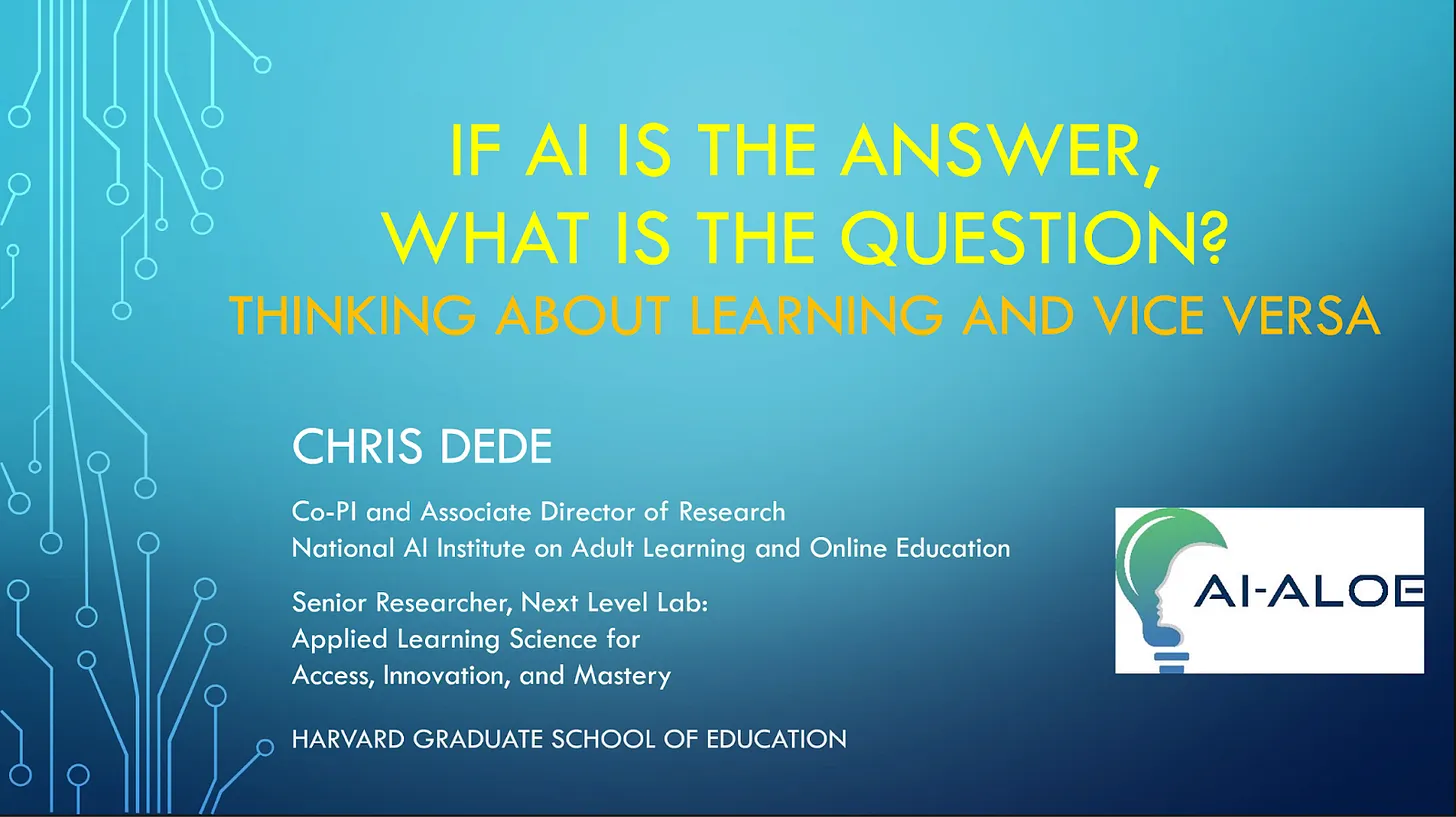What value do you offer? — from linkedin.com by Dan Fitzpatrick — The AI Educator
Excerpt (emphasis DSC):
So, as educators, mentors, and guides to our future generations, we must ask ourselves three pivotal questions:
- What value do we offer to our students?
- What value will they need to offer to the world?
- How are we preparing them to offer that value?
The answers to these questions are crucial, and they will redefine the trajectory of our education system.
We need to create an environment that encourages curiosity, embraces failure as a learning opportunity, and celebrates diversity. We need to teach our students how to learn, how to ask the right questions, and how to think for themselves.
5 Little-Known ChatGPT Prompts to Learn Anything Faster — from medium.com by Eva Keiffenheim
Including templates, you can copy.
Leveraging ChatGPT for learning is the most meaningful skill this year for lifelong learners. But it’s too hard to find resources to master it.
As a learning science nerd, I’ve explored hundreds of prompts over the past months. Most of the advice doesn’t go beyond text summaries and multiple-choice testing.
That’s why I’ve created this article — it merges learning science with prompt writing to help you learn anything faster.
From DSC:
This is a very nice, clearly illustrated, free video to get started with the Midjourney (text-to-image) app. Nice work Dan!
Also see Dan’s
AI Generated Immersive Learning Series
What is Academic Integrity in the Era of Generative Artificial intelligence? — from silverliningforlearning.org by Chris Dede
In the new-normal of generative AI, how does one articulate the value of academic integrity? This blog presents my current response in about 2,500 words; a complete answer could fill a sizable book.
Massive amounts of misinformation are disseminated about generative AI, so the first part of my discussion clarifies what large language models (Chat-GPT and its counterparts) can currently do and what they cannot accomplish at this point in time. The second part describes ways in which generative AI can be misused as a means of learning; unfortunately, many people are now advocating for these mistaken applications to education. The third part describes ways in which large language models (LLM), used well, may substantially improve learning and education. I close with a plea for a robust, informed public discussion about these topics and issues.
Dr. Chris Dede and the Necessity of Training Students and Faculty to Improve Their Human Judgment and Work Properly with AIs — from stefanbauschard.substack.com by Stefan Bauschard
We need to stop using test-driven curriculums that train students to listen and to compete against machines, a competition they cannot win. Instead, we need to help them augment their Judgment.
The Creative Ways Teachers Are Using ChatGPT in the Classroom — from time.com by Olivia B. Waxman
Many of the more than a dozen teachers TIME interviewed for this story argue that the way to get kids to care is to proactively use ChatGPT in the classroom.
…
Some of those creative ideas are already in effect at Peninsula High School in Gig Harbor, about an hour from Seattle. In Erin Rossing’s precalculus class, a student got ChatGPT to generate a rap about vectors and trigonometry in the style of Kanye West, while geometry students used the program to write mathematical proofs in the style of raps, which they performed in a classroom competition. In Kara Beloate’s English-Language Arts class, she allowed students reading Shakespeare’s Othello to use ChatGPT to translate lines into modern English to help them understand the text, so that they could spend class time discussing the plot and themes.
AI in Higher Education: Aiding Students’ Academic Journey — from td.org by J. Chris Brown
Topics/sections include:
Automatic Grading and Assessment
AI-Assisted Student Support Services
Intelligent Tutoring Systems
AI Can Help Both Students and Teachers
Shockwaves & Innovations: How Nations Worldwide Are Dealing with AI in Education — from the74million.org by Robin Lake
Lake: Other countries are quickly adopting artificial intelligence in schools. Lessons from Singapore, South Korea, India, China, Finland and Japan.
I found that other developed countries share concerns about students cheating but are moving quickly to use AI to personalize education, enhance language lessons and help teachers with mundane tasks, such as grading. Some of these countries are in the early stages of training teachers to use AI and developing curriculum standards for what students should know and be able to do with the technology.
Several countries began positioning themselves several years ago to invest in AI in education in order to compete in the fourth industrial revolution.
AI in Education — from educationnext.org by John Bailey
The leap into a new era of machine intelligence carries risks and challenges, but also plenty of promise
In the realm of education, this technology will influence how students learn, how teachers work, and ultimately how we structure our education system. Some educators and leaders look forward to these changes with great enthusiasm. Sal Kahn, founder of Khan Academy, went so far as to say in a TED talk that AI has the potential to effect “probably the biggest positive transformation that education has ever seen.” But others warn that AI will enable the spread of misinformation, facilitate cheating in school and college, kill whatever vestiges of individual privacy remain, and cause massive job loss. The challenge is to harness the positive potential while avoiding or mitigating the harm.
Generative AI and education futures — from ucl.ac.uk
Video highlights from Professor Mike Sharples’ keynote address at the 2023 UCL Education Conference, which explored opportunities to prosper with AI as a part of education.
Bringing AI Literacy to High Schools — from by Nikki Goth Itoi
Stanford education researchers collaborated with teachers to develop classroom-ready AI resources for high school instructors across subject areas.
To address these two imperatives, all high schools need access to basic AI tools and training. Yet the reality is that many underserved schools in low-income areas lack the bandwidth, skills, and confidence to guide their students through an AI-powered world. And if the pattern continues, AI will only worsen existing inequities. With this concern top of mind plus initial funding from the McCoy Ethics Center, Lee began recruiting some graduate students and high school teachers to explore how to give more people equal footing in the AI space.











